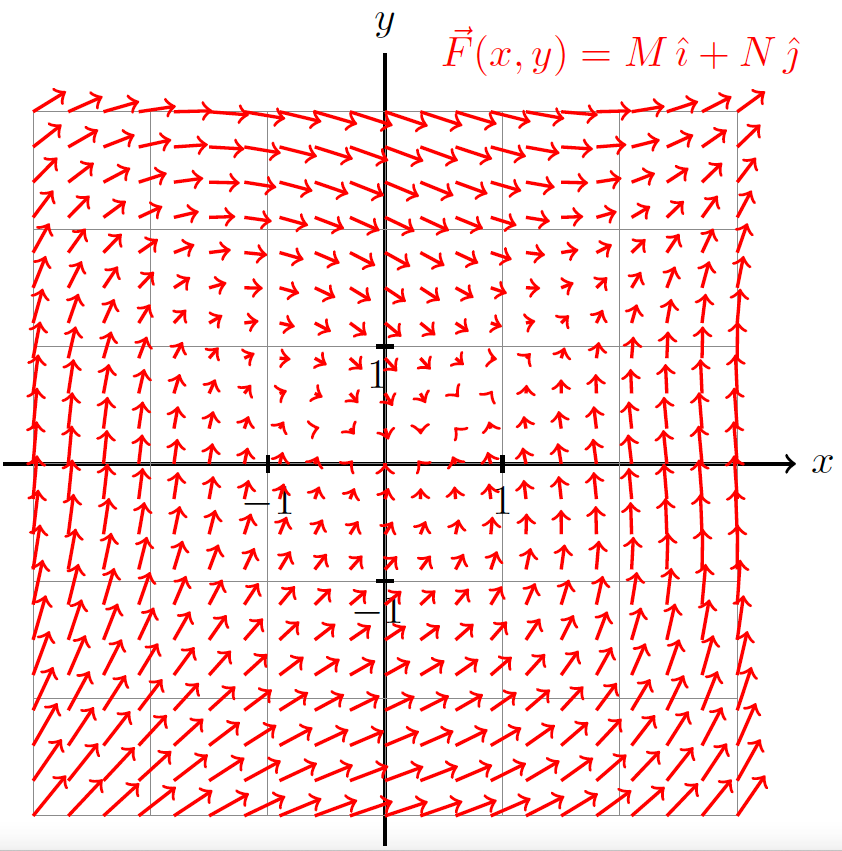Edit and compile if you like:
\documentclass{article}
\usepackage{tikz}
\usetikzlibrary{math}
\usepackage{ifthen}
\usepackage[active,tightpage]{preview}
\PreviewEnvironment{tikzpicture}
\setlength\PreviewBorder{1pt}
%
% File name: directional-angles.tex
% Description:
% The directional angles of a vector are geometrically represented.
%
% Date of creation: August, 29th, 2021.
% Date of last modification: October, 9th, 2022.
% Author: Efraín Soto Apolinar.
% https://www.aprendematematicas.org.mx/author/efrain-soto-apolinar/instructing-courses/
% Source: page 36 of the
% Glosario Ilustrado de Matem\'aticas Escolares.
% https://tinyurl.com/5udm2ufy
%
% Terms of use:
% According to TikZ.net
% https://creativecommons.org/licenses/by-nc-sa/4.0/
% Your commitment to the terms of use is greatly appreciated.
%
\begin{document}
%
\begin{tikzpicture}
% Components of the vector field
\tikzmath{function equis(\x,\y) {return (\y*\y-0.25*\x);};}
\tikzmath{function ye(\x,\y) {return \x*\x-\y;};}
\tikzmath{function zeta(\x,\y) {return \x+\y;};}
\tikzmath{function magnitud(\x,\y) {return sqrt(\x*\x+\y*\y);};} % magnitude of the vector at (x, y, z)
%
\pgfmathsetmacro{\dominio}{3.0} % domain for computation
\pgfmathsetmacro{\step}{\dominio/10.0} % step size
\pgfmathsetmacro{\max}{\dominio}
\pgfmathsetmacro{\xi}{-\dominio}
\pgfmathsetmacro{\xf}{\dominio}
\pgfmathsetmacro{\xs}{\xi+\step}
\pgfmathsetmacro{\yi}{-\dominio}
\pgfmathsetmacro{\yf}{\dominio}
\pgfmathsetmacro{\ys}{\yi+\step}
% length of coordinate axis
\pgfmathsetmacro{\ejex}{\dominio+0.50}
\pgfmathsetmacro{\ejez}{\dominio+0.50}
% Coordinate axis
\draw[thick,->] (\xi-0.25,0) -- (\xf+0.5,0) node[right] {$x$}; % Eje x
\draw[thick] (0,\yi-0.25,0) -- (0,\yf+0.5) node[above] {$y$}; % Eje y
\draw[help lines] (\xi,\yi) grid (\xf,\yf);
\foreach \x in {-1,1}
\draw[thick] (\x,2pt) -- (\x,-2pt) node [below] {$\x$};
\foreach \y in {-1,1}
\draw[thick] (2pt,\y) -- (-2pt,\y) node [below] {$\y$};
% The vector field
\foreach \x in {\xi,\xs,...,\xf}{
\foreach \y in {\yi,\ys,...,\yf}{
% Components of the vector at (\x,\y)
\pgfmathsetmacro{\vx}{0.125*equis(\x,\y)/(magnitud(\x,\y)+0.1)}
\pgfmathsetmacro{\vy}{0.125*ye(\x,\y)/(magnitud(\x,\y)+0.1)}
\draw[red,thick,->] (\x,\y) -- (\x+\vx,\y+\vy);
}
}
\node[red,above,shift={(-1,5pt)}] at (\xf,\yf) {$\vec{F}(x,y) = M\,\hat{\imath} + N\,\hat{\jmath}$};
%
\end{tikzpicture}
%
\end{document}Click to download: vector-field.tex • vector-field.pdf
Open in Overleaf: vector-field.tex
See more on the author page of Efraín Soto Apolinar.



